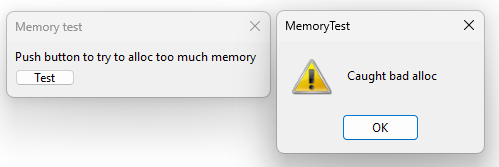Home » U++ Library support » U++ Core » How to respond when memory is exceeded
| Re: How to respond when memory is exceeded [message #61111 is a reply to message #61110] |
Mon, 18 November 2024 19:48   |
 |
 mirek
mirek
Messages: 14285
Registered: November 2005
|
Ultimate Member |
|
|
koldo wrote on Mon, 18 November 2024 19:36mirek wrote on Mon, 18 November 2024 12:31koldo wrote on Mon, 18 November 2024 10:09Hello Mirek
This is a very simple test code to force the problem:
GUI_APP_MAIN
{
WithMain<TopWindow> dlg;
CtrlLayout(dlg, "Memory test");
dlg.butTest.WhenAction = []{
try {
Buffer<int> data;
data.Alloc(123456789012, 0);
PromptOK("Memory is alloc");
} catch (const std::bad_alloc& e) {
Exclamation("Caught bad_alloc");
}
};
dlg.Execute();
}

And this is the change in U++:
void OutOfMemoryPanic(size_t size)
{
throw std::bad_alloc();
/*char h[200];
snprintf(h, 200, "Out of memory!\nU++ allocated memory: %d KB", MemoryUsedKb());
Panic(h);*/
}
When pushing the button 5 times, no problem happens. Visually monitoring the Windows Task Manager, MemoryTest.exe seems to use the same memory all the time.
However, pushing the button one more time, MemoryLimitKb breached! Panic appears. It happens the same in debug and in release.
That is "buggy code" example. For something more real, try
#include <CtrlLib/CtrlLib.h>
using namespace Upp;
GUI_APP_MAIN
{
TopWindow win;
win.Title("Testing");
win.WhenClose << [] {
try {
for(;;) {
byte *data = new byte[1024 * 4096];
for(int i = 0; i < 1024; i++)
data[i * 4096] = 1;
}
} catch (const std::bad_alloc&) {
Exclamation("Caught bad_alloc");
}
};
win.Run();
}
And try that in Linux...
That said, whatever, I think this really is totally futile, but I am going to change the code to actually throw bad_alloc, then catch it in main and do Panic there. I am NOT going to change the U++ code to work correctly in case bad_alloc is thrown, but maybe I will be able to compile some rules (like everything in try block has to be destructed). What a waste of time...
Hi Mirek
I think that the for with allocs is really an example of bad code.
Imagine that you are doing a new Notepad++, and the user wants to open a file of, let's say, XXX Tb.
Two options:
a) Your Notepad++ would say "File too big", and will follow working normally.
b) Exclamation() dialog, and program closes
I prefer option a)
c) theide just views the file in read-only mode.
I prefer option c)
But really, notepad will need to allocate individual lines while loading, so the allocation pattern will look just like my example. Not like yours. Billions of small allocations until the memory is exhausted.
Mirek
|
|
|
|
 |
|
How to respond when memory is exceeded
By: koldo on Wed, 16 October 2024 09:41 |
 |
|
Re: How to respond when memory is exceeded
By: Lance on Wed, 16 October 2024 15:27 |
 |
|
Re: How to respond when memory is exceeded
By: koldo on Wed, 16 October 2024 16:18 |
 |
|
Re: How to respond when memory is exceeded
By: Lance on Wed, 16 October 2024 17:22 |
 |
|
Re: How to respond when memory is exceeded
By: mirek on Sun, 17 November 2024 16:07 |
 |
|
Re: How to respond when memory is exceeded
By: Lance on Mon, 18 November 2024 05:24 |
 |
|
Re: How to respond when memory is exceeded
By: mirek on Mon, 18 November 2024 08:01 |
 |
|
Re: How to respond when memory is exceeded
By: koldo on Mon, 18 November 2024 08:17 |
 |
|
Re: How to respond when memory is exceeded
By: mirek on Mon, 18 November 2024 08:39 |
 |
|
Re: How to respond when memory is exceeded
By: koldo on Mon, 18 November 2024 10:09 |
 |
|
Re: How to respond when memory is exceeded
By: mirek on Mon, 18 November 2024 12:31 |
 |
|
Re: How to respond when memory is exceeded
By: Lance on Mon, 18 November 2024 16:15 |
 |
|
Re: How to respond when memory is exceeded
By: koldo on Mon, 18 November 2024 19:36 |
 |
|
Re: How to respond when memory is exceeded
By: mirek on Mon, 18 November 2024 19:48 |
 |
|
Re: How to respond when memory is exceeded
By: koldo on Mon, 18 November 2024 20:01 |
 |
|
Re: How to respond when memory is exceeded
By: mirek on Tue, 19 November 2024 12:14 |
Goto Forum:
Current Time: Wed Jan 28 20:24:01 CET 2026
Total time taken to generate the page: 0.14221 seconds
|
